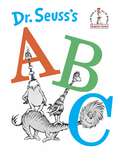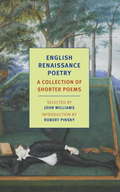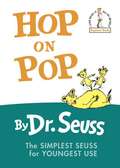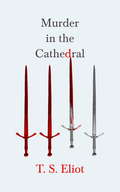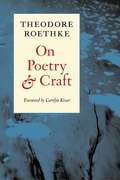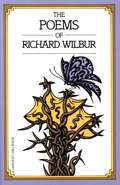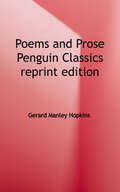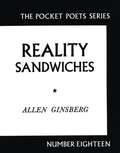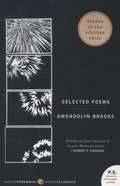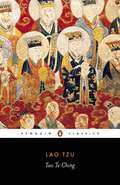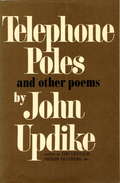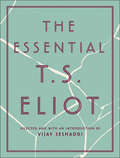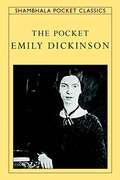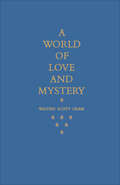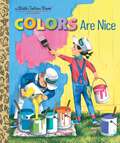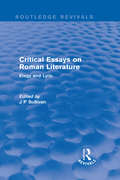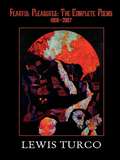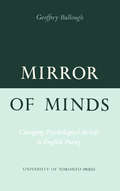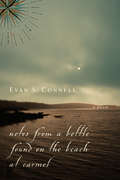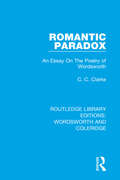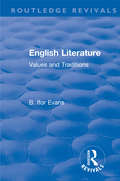- Table View
- List View
Dr. Seuss's ABC (Beginner Books(R))
by Dr. SeussArguably the most entertaining alphabet book ever written, this classic Beginner Book by Dr. Seuss is perfect for children learning their ABCs. Featuring a fantastic cast of zany characters—from Aunt Annie&’s alligator to the Zizzer-Zazzer-Zuzz, with a lazy lion licking a lollipop and an ostrich oiling an orange owl—Dr. Seuss&’s ABC is a must-have for every young child&’s library. Originally created by Dr. Seuss, Beginner Books encourage children to read all by themselves, with simple words and illustrations that give clues to their meaning.
English Renaissance Poetry
by Robert Pinsky John WilliamsAN ANTHOLOGY FROM THE AUTHOR OF STONERPoetry in English as we know it was largely invented in England between the early 1500s and 1630, and yet for many years the poetry of the era was considered little more than a run-up to Shakespeare. The twentieth century brought a reevaluation, and the English Renaissance has since come to be recognized as the period of extraordinary poetic experimentation that it was. Never since have the possibilities of poetic form and, especially, poetic voice--from the sublime to the scandalous and slangy--been so various and inviting. This is poetry that speaks directly across the centuries to the renaissance of poetic exploration in our own time.John Williams's celebrated anthology includes not only some of the most famous poems by some of the most famous poets of the English language (Sir Thomas Wyatt, John Donne, and of course Shakespeare) but also----and this is what makes Williams's book such a rare and rich resource--the strikingly original work of little-known masters like George Gascoigne and Fulke Greville.
Hop on Pop
by Dr SeussLoved by generations, this "simplest Seuss for youngest use" is a beginner book classic. See Red and Ned and Ted and Ed in a bed. And giggle as Pat sits on a hat and on a cat and on a bat... and almost sits on a cactus! Pat must NOT sit on that! All images are described. Originally created by Dr. Seuss, Beginner Books encourage children to read all by themselves, with simple words and illustrations that give clues to their meaning.
Murder in the Cathedral
by T. S. EliotA vivid exploration of the fundamental contradiction of martyrdom. Though best known for his poetry, T.S. Eliot was also an accomplished playwright. Murder in the Cathedral is a beautiful, haunting poetic take on the martyrdom of Archbishop Thomas Becket in 1170. Becket sees his death coming, but embraces it. This strange duality - a martyr's death as both tragic and glorious - serves as the basis for the action. Penguin Random House Canada is proud to bring you classic works of literature in e-book form, with the highest quality production values. Find more today and rediscover books you never knew you loved.
On Poetry and Craft
by Carolyn Kizer Theodore Roethke"One of the virtues of good poetry is the fact that it irritates the mediocre."Theodore Roethke was one of the most famous and outspoken poets and poetry teachers this country has ever known. In this volume of selected prose, Roethke articulates his commitments to imaginative possibilities, offers tender advice to young writers, and zings darts at stuffed shirts, lightweights and fools."Art is our defense against hysteria and death."With the assistance of Roethke's widow, this volume has been edited to include the finest selections from out of print collections of prose and journal entries. Focused on the making and teaching of poetry,On Poetry and Craft will be prized in the classroom-and outrageous Roethke quotes will once again pepper our conversations."You must believe a poem is a holy thing, a good poem, that is."Theodore Roethke was of an illustrious generation of poets which included Sexton, Plath, Lowell, Berryman, and like them he received nearly every major award in poetry, including the Pulitzer Prize and twice the National Book Award. In spite of his fame, he remained a legendary teacher, known for the care and attention he gave to his students, poets such as James Wright, Carolyn Kizer, Tess Gallagher, and Richard Hugo. Roethke died on August 1, 1963, while swimming in a friend's pool."But before I'm reduced to an absolute pulp by my own ambivalence, I must say goodbye. The old lion perisheth. Nymphs, I wish you the swoops of many fish. May your search for the abiding be forever furious."On Poetry and CraftI am overwhelmed by the beautiful disorder of poetry, the eternal virginity of words.The poem, even a short time after being written, seems no miracle; unwritten, it seems something beyond the capacity of the gods.We can't escape what we are, and I'm afraid many of my notions about verse (I haven't too many) have been conditioned by the fact that for nearly 25 years I've been trying to teach the young something about the nature of verse by writing it--and that with very little formal knowledge of the subject or previous instruction. So it's going to be lik
Poems Of Richard Wilbur
by Richard WilburThis collection includes Advice to a Prophet and Other Poems, Things of This World, Ceremony and Other Poems, and The Beautiful Changes and Other Poems. "One of the best poets of his generation, Richard Wilbur has imagined excellence, and has created it" (Richard Eberhart, New York Times Book Review).
Poems and Prose
by Gerard Manley HopkinsDazzling in its prosodic innovations, such as the 'sprung rhythm' he pioneered, and wide-ranging in its complexity and metaphysical interest. The Penguin Classics edition of Gerard Manley Hopkins's Poems and Prose is selected and edited with an introduction by W.H. Gardner. Closer to Dylan Thomas than Matthew Arnold in his 'creative violence' and insistence on the sound of poetry, Gerard Manley Hopkins was no staid, conventional Victorian. On entering the Jesuit order the age of twenty-four, he burnt all his poetry and 'resolved to write no more, as not belonging to my profession, unless by the wishes of my superiors'. The poems, letters and journal entries selected for this edition were written in the following twenty years of his life, and published posthumously in 1918. His verse is wrought from the creative tensions and paradoxes of a poet-priest who wanted to evoke the spiritual essence of nature sensuously, and to communicate this revelation in natural language and speech-rhythms while using condensed, innovative diction and all the skills of poetic artifice.
Reality Sandwiches
by Allen GinsbergAllen Ginsberg's poetry collection, Reality Sandwiches, appeared in 1961. The title came from an earlier poem of his, "On Burroughs' Work," which described his experience of reading the manuscript that became Naked Lunch. Here's an excerpt: "actual visions & actual prisions as seen then and now... A naked lunch is natural to us, we eat reality sandwiches."
Selected Poems
by Gwendolyn BrooksThe classic volume by the distinguished modern poet, winner of the 1950 Pulitzer Prize, and recipient of the National Book Foundation Medal for Distinguished Contribution to American Letters, showcases an esteemed artist's technical mastery, her warm humanity, and her compassionate and illuminating response to a complex world.
Tao Te Ching
by D. C. Lau Lao TzuIn eighty-one brief chapters, Lao-tzu's Tao Te Ching, or Book of the Way, provides advice that imparts balance and perspective, a serene and generous spirit, and teaches us how to work for the good with the effortless skill that comes from being in accord with the Tao-- the basic principle of the universe.
Telephone Poles and Other Poems
by John UpdikeWHEN, five years and five books of fiction ago, THE CARPENTERED HEN, John Updike's first collection of verse, was published, Phyllis McGinley wrote: "I have been happily reading Mr. Updike in The New Yorker for some time and am happy, now, to own him collected. When he first appeared in that magazine, I was so elated to see a new name in light verse that I felt like crying with the Ancient Mariner 'A Sail, A Sail!' His is what poetry of this sort exactly out to be--playful but elegant, sharp-eyed, witty." In the Saturday Review, David McCord wrote: "Furthermore, he is a graceful border-crosser (light verse to poem) as Auden has been; as Betjeman and McGinley frequently are." This second collection is equally divided between poems that, in their verbal jugglery and humorous bias, seem to qualify as "light" and poems that, one way or other, cross the problematic border into the general realm of poetry. The distinction cannot be clear-cut. The poet is consistently concerned with Man's cosmic embarrassment, and the same vision illuminates the creatures of "The High Hearts" and "Seagulls." Science and religion, so frequently and variously invoked, frame a single paradox, the paradox of the mundane; and each poem, whether inspired by an antic headline or a suburban landscape, rejoices in the elusive surface of created things.
The Essential T.S. Eliot
by T.S. EliotA selection of the most significant and enduring poems from one of the twentieth century’s major writers, chosen and introduced by Vijay SeshadriT.S. Eliot was a towering figure in twentieth century literature, a renowned poet, playwright, and critic whose work—including “The Love Song of J. Alfred Prufrock” (1915), The Waste Land (1922), Four Quartets (1943), and Murder in the Cathedral (1935)—continues to be among the most-read and influential in the canon of American literature. The Essential T.S. Eliot collects Eliot’s most lasting and important poetry in one career-spanning volume, now with an introduction from Vijay Seshadri, one of our foremost poets.
The Odyssey
by Homer Robert FitzgeraldWinner of the 1961 Bollingen Award for the best translation of a poem into English, Homer's epic poem shines through this perceptive translation. [This text is listed as an example that meets Common Core Standards in English language arts in grades 9-10 at http://www.corestandards.org.]
The Oxford Book of Poetry for Children
by Edward BlishenA compilation of many famous children's poems.
The Pocket Emily Dickinson
by Emily Dickinson Brenda HillmanConsidered by many to be the spiritual mother of American poetry, Emily Dickinson (1830–1886) was one of the most prolific and innovative poets of her era. Well-known for her reclusive personal life in Amherst, Massachusetts , her distinctively short lines, and eccentric approach to punctuation and capitalization, she completed over seventeen hundred poems in her short life. Though fewer than a dozen of her poems were actually published during her lifetime, she is still one of the most widely read poets in the English language. Over one hundred of her best poems are collected here.
A World of Love and Mystery
by Walden Scott CramA World of Love and Mystery is a collection of poetry divided into three parts written by the poet Walden Scott Cram.
Colors Are Nice (Little Golden Book)
by Adelaide HollA beloved 1962 Little Golden Book about colors (and not just primary ones) is back in print!"I like the way the sky is blue,And I like orange oranges, too.But I LOVE mixed-up colors best—A baby robin's speckled breast,Blackish dots on greenish frogs,Rainbow beetles under logs."This poetic look at colors, told in simple rhyme, celebrates not only primary colors, but "colors all mixed up!" Cheerful, elegant rhyme teaches about stripes, sparkles, and spots on adorable animals and in beautiful landscapes. Noted illustrator Leonard Shortall's lush illustrations of adorable animals and children will once again captivate little ones.
Critical Essays on Roman Literature: Elegy and Lyric (Routledge Revivals: Critical Essays on Roman Literature #1)
by J P SullivanFirst published in 1962, this book is the first of two volumes which bridge the gap between the study of classics and the study of literature and attempt to reconcile the two disciplines. Focusing on elegy and lyric, this collection of essays offers a critical examination of Latin literature and aims to stimulate critical discussion of a selection of Latin poets. This experimental and ground-breaking book will be of particular interest to students of Roman Literature, Classics and Poetry.
Fearful Pleasures: The Complete Poems, 1959-2007
by Lewis TurcoThis is the long-awaited collection of Lewis Turco's poems, comprising a dozen books in one. Rhina P. Espaillat, poet, concludes her Foreword to the book with these words: "And how fortunate the reading public is to have this wealth of writing by one of the country¿s most interesting poets now in one volume, not so much a book as a library of books, composed by the many persons who inhabit this haunted and perceptive poet! It belongs on the bookshelf of every reader willing to risk the joy and anguish of hearing the world, having it speak to him as vividly, ambiguously and honestly as it speaks to Lewis Turco."
For Love: Poems 1950-1960
by Robert Creeley"At its concentrated best, the sting of this poetry is indelible. Formally the poems are miniatures... but there is nothing of the miniature in the power that they release. . . . Theirs is the compression of the lyric epigram, taut, hard, constrained, graven upon the page." -Dudley Fitts, Saturday Review
Mirror of Minds: Psychological Beliefs in English Poetry
by Geoffrey BulloughThe aim of the author, who has long been interested in the history of ideas, has been to give some illustrations of the ways in which at various periods English poetry has reflected current views of the human mind, with special reference to such topics as its place in the cosmos, its relations with the body, the connections between sense, passions, and reason, the problem of soul and its possible survival after death. The subject matter is important, for many of the more self-conscious writers have been profoundly affected by their assumptions about the senses and passions, the reason and the imagination.The author traces four main historical phases in each of which different aspects and potentialities of the mind have been stressed. Chapter I discusses the microcosmic conception of man inherited from the Middle Ages and traces its influence in some allegorical and didactic verse, lyric and epic. Chapter II considers the development of Shakespeare's attitude to the mind and human character. Chapter III turns to some effects (between Dryden and Wordsworth) of the seventeenth-century revolution in philosophy and science, including the search for clarity and order, the Augustan interest in reason and the passions, and the rise of the association of psychology. Chapter IV shows how the Romantic poets made use of associations and intuitions, and discusses the Victorian poets' hopes and fears about immortality in relation to the advance of science. The last chapter traces the influence of the philosophy of the "moment" from the aesthetes to T.S. Eliot, and distinguishes the effects of some twentieth-century psychologies in modern poetry.Poets, of course, have rarely been systematic philosophers or psychologists; they have usually picked out and applied imaginatively only a few notions from contemporary thought. Consequently this study does not attempt to set the history of English poetry squarely against the history of philosophy. Rather, characteristic topics and writers have been selected and the discussion of them will be seen to throw light on some major imaginative preoccupations of each age. The student of English poetry and the history of ideas will find valuable comments on the major writers from Chaucer and Spenser down through Shakespeare and Milton, Dryden, Wordsworth, Shelley, Tennyson, Browning, Hardy and on a variety of modern poets such as Bridges, Eliot, Sitwell, Auden, and Graces.Alexander Lecture Series.
Notes from a Bottle Found on the Beach at Carmel: A Poem
by Evan S. ConnellPraise for Notes from a Bottle Found on the Beach at Carmel"A unique tour de force" -The New York Times Book Review"One of the most remarkable books that I have read in a long time." -Kenneth Rexroth"Mr. Connell's NOTES are what one intelligent, sensitive artist has been able to salvage from all experience as testimony to the rather pathetic integrity of the human species in the face of extinction. The book is no manual or tract, however, although its political meaning is unmistakable, but a work of art, even a work of high art." -Hayden Carruth
Romantic Paradox: An Essay on the Poetry of Wordsworth (RLE: Wordsworth and Coleridge #2)
by C.C. ClarkeFirst published in 1962, this book reveals unexpected complexity or equivocation in Wordsworth’s use of certain key words, particularly ‘image’, ‘form’ and ‘shape’. The author endeavours to show that this complexity is related to the poet’s awareness of the ambiguity of the perceptual process. Numerous passages from The Prelude and other poems are analysed to illustrate the argument and to show that, because of this doubt or hidden perplexity, Wordsworth’s poetry has a far richer texture, is more concentrated, intricately organised and loaded with ambivalent meanings than it would otherwise have been. New light is also shed on Wordsworth’s debt to Akenside.
Routledge Revivals: Values and Traditions (Routledge Revivals)
by B. Ifor EvansFirst published in 1962, this book is a reflection on Sir Ifor Evans’s well-known A Short History of English Literature. In this reflective study, Evans wonders if it is possible to trace permanent elements in such a huge and varied mass of writings? As he moves from the Anglo-Saxon Caedmon to T.S Eliot, or from Milton to James Joyce, he finds out how, in unexpected ways, the English spirit of compromise extends into its literature, along with its love of nature and interest in the individual. In poetic imagery above all the British genius seems, typically, to have found a way of making ‘empiricism transcendental’. This book, which had its origin during the war under the aegis of the British Council, provides the reader with a stimulating passport to a very rich kingdom.
